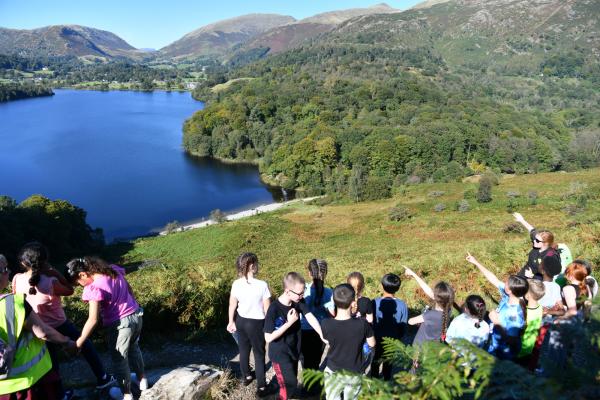Introduction
Generation Green 2 is a £4.5m project to connect more than 25,000 young people living in England’s most socially disadvantaged areas to nature and rural life by taking them on inspiring experiences in beautiful protected places.
By the end of the project in spring 2025, Generation Green 2 will have delivered more than 41,500 nights under the stars, residentials and nature connection experiences to young people. Participants would otherwise be the least likely demographic in the country to spend time in the nation’s most beautiful landscapes.
Generation Green 2 will build on the work of the first Generation Green project, which connected more than 100,000 young people to nature through a range of initiatives and helped to build an aspirant workforce for a green recovery.

Why is the project needed?
Poorer communities and people from ethnic minorities in the UK have the worst access to green spaces.
- The most affluent 20% of areas in the UK have five times the amount of green space than the most deprived 10%.
- Almost half of the country’s most socially deprived areas are more than 15 miles by road from a protected landscape such as a National Park or National Landscape.
- Opportunities to explore these landscapes are further hindered by inadequate transport options.
Generation Green 2 aims to help address these inequalities by cultivating a wider interest in green spaces and protected places among the next generation. As highlighted by the 2019 Landscapes Review, this is essential both for the lifelong health and wellbeing of the participants, but also for the wider aim of making protected landscapes like National Parks and National Landscapes fit for the future by increasing their relevance to a wider demographic.
Connections to nature improve wellbeing
Research shows that people who are more connected with nature are usually more likely to report feeling their lives are worthwhile. Throughout the pandemic, 45% of people in the UK told the Mental Health Foundation that visiting green spaces helped them to cope.
The ‘quality’ of our connection to nature also matters. The closer we feel to it, the more we are willing to take action to help our wildlife and the environment. In the context of collapsing biodiversity and the climate crisis, closer relationships with nature are more vital than ever before. The UK is one of the poorest countries in Europe for nature-connectedness, ranking 16th out of 18th countries surveyed.
Research by the University of Derby has demonstrated five key pathways for a better connection with nature. Both Generation Green projects aim to cultivate the use of these pathways, and the University of Derby is helping to evaluate the success of the projects in fostering nature connection among participants.
Icons

Physical contact with the natural world

Finding an emotional bond with, and love for, nature

Taking time to appreciate the beauty of nature

Thinking about the meaning and signs of nature

Showing compassion and care for nature
How will this project help?
This project is seeing young people taking part in nights under the stars, multi-day residentials, farm visits and day trips, all based in National Parks, National Landscapes and Sites of Special Scientific Interest. These experiences will help young people connect with nature, cultivate a sense of care for the countryside, and enjoy the wellbeing benefits of spending time in the outdoors.
An independent evaluation carried out by the University of Derby showed that the facilitated day and residential trips in the first Generation Green project led to an immediate significant impact in young people’s connection with nature and sense of inclusion in nature.
Who will benefit from this project?
Participants in the project will be young people from geographic locations in England falling into the Index of Multiple Deprivation scale (1-3) and schools where at least 30% of pupils are eligible for Pupil Premium funding.
At the core of this demographic are young people that are traditionally less likely – due to social, economic and cultural factors – to connect with nature, or engage with nature and nature preservation/conservation.
Generation Green partners
Who is running the project?
The programme is delivered by Access Unlimited, a unique coalition of not-for-profit youth organisations, school residential outdoor providers and organisations managing protected landscapes.
How is the project funded?
Funding for Generation Green 2 has been provided by the Department for Environment, Food and Rural Affairs (Defra) as part of its ongoing support of access to nature.
The project supports key recommendations in the 2019 Landscapes Review, addressing the need for a wider range of first-time visitors to engage with protected landscapes in order to help make them fit for the future.








